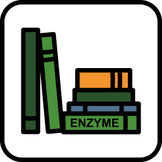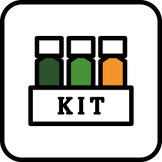BioNukleo - combining biocatalysis and nucleosides
Enzymatic synthesis of nucleosides, nucleotides, and their derivatives
At BioNukleo, we harness the power of enzymes to provide sustainable solutions for the synthesis of various fine chemicals, focusing on nucleoside and nucleotide derivatives and related compounds. By combining our extensive knowledge about biocatalysis and nucleosides we can provide custom biocatalytic solutions with high selectivity and reduced environmental impact, aligning with the demand for sustainable chemical manufacturing.
How to work with us
We can design your biocatalytic process
Our process development service focuses on creating tailored enzymatic workflows precisely designed for your target synthesis. We support you from concept to implementation, optimizing every step to ensure efficiency, selectivity, and sustainability in your production process.
Use our enzymes in your own setting
Discover our diverse enzyme library, featuring a wide range of characterized and purified biocatalysts ready for your reaction screening. Whether you’re exploring new catalytic routes or fine-tuning existing ones, our enzymes provide a solid foundation for innovation and performance.
Utilize our ready-to-use kits
Explore our ready-to-use enzyme kits for effortless integration into your lab. From quantitative phosphate detection with the PUB assay to triphosphorylation of nucleosides with our Nucleoside2NTP Kits, each kit provides all essential components for reliable, high-performance results.
Directly shop our fine chemicals
Our expertise in enzymatic synthesis enables flexible, high-quality, and cost-effective manufacturing of fine chemicals in the broad field of nucleic acid research. We offer substrates such as sugar-1-phosphates and phosphate donors as well as catalog or custom-made nucleoside 5'-triphosphate products.
Experience you can count on
years
expertise
successful
projects
characterized
enzymes
tested
compounds
“We developed the first chromatography-free technique to quantify all twelve canonical ribonucleotides from biological samples. For this purpose, we needed suitable kinases to phosphorylate
the target nucleotides into their triphosphate forms. Luckily, I found BioNukleo and their large collection of kinases and other nucleoside-modifying enzymes. I could order all the necessary
kinases from a single source at an affordable price. Importantly, the kinases worked as promised. Equally importantly, they were free from unintended enzymatic activities, which was instrumental
for our assay."
Janne Purhonen, PhD, Folkhälsan Research Center, Finland; and Karolinska Institutet, Sweden









